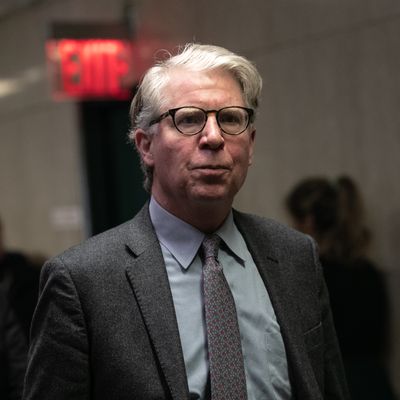
Manhattan District Attorney Cyrus Vance Jr. said Friday he’ll be stepping down at the end of his term, just as his office takes on the biggest case of his career or of any prosecutor’s in history: a criminal investigation into an ex-president, Donald Trump.
Vance’s announcement that he will not seek a fourth term comes weeks after his team won a critical battle at the Supreme Court to obtain millions of pages of tax records and other documents related to Trump’s company. Over the past year, prosecutors revealed in court papers they were probing “public reports of possibly extensive and protracted criminal conduct at the Trump Organization,” including potential tax fraud. Vance has also hired financial accounting experts and brought on Mark F. Pomerantz, a former federal prosecutor with extensive experience in white-collar crime, for this probe. Investigators seem to be poring over just about everything in Trump’s business empire, from ice-skating rinks he owns in Manhattan to a property in Chicago, and digging in on the Trump Organization’s chief financial officer, Alan Weisselberg, and his family.
Despite the conviction of Harvey Weinstein last year, Vance has faced severe criticism during his tenure: He didn’t prosecute Weinstein earlier, declined to prosecute Ivanka and Donald Trump Jr. for real-estate fraud, but was accused of throwing the book at people of lesser means, especially people of color. As such, he faced steep reelection odds against no fewer than eight Democratic candidates vying for what’s been described as “the most prestigious law-enforcement job in New York City.” (No Republican is running.) Five of the eight candidates have worked as prosecutors; not surprisingly, all eight insist they are uniquely suited to the job. While these candidates have all made some type of criminal-justice reform key to their campaign, the victor will inherit Vance’s investigation into Trump.
Several former prosecutors emphasized that the new district attorney must have the legal and managerial background for the office to work well — not just for the Trump investigation, but for other complex inquiries routinely handled by its prosecutors. Intelligencer spoke with these attorneys prior to Vance’s announcement, given that he telegraphed his decision not to run by raising almost no money for reelection.
“I think it’s really important for the incoming district attorney to have experience prosecuting and managing white-collar cases, in part because of the importance of the investigation into Trump and his organization,” said Rebecca Roiphe, a former prosecutor in the Manhattan DA’s office who’s now a professor at New York Law School. “Traditionally, white-collar cases have been a central part of the mission of the district attorney in Manhattan.”
Roiphe pointed out that it’s unclear where the investigation will end up — such as whether indictments will come down and if they did, who would be indicted. “No matter what, I think it’s critically important that the person has those managerial skills and experience in the complexity of white-collar crime.”
Daniel R. Alonso, a partner in Buckley LLP’s New York office who previously worked as a federal prosecutor in Brooklyn, voiced similar views, emphasizing the importance of a DA’s relationships with their staff.
“One would hope that the new district attorney would keep the team in place, and also protect the team from any potential political interference, or media firestorm, or physical threat. That’s going to be his or her job to protect the team, make sure the team keeps their heads down and handles the case,” Alonso said. “For that reason, you need somebody who both understands complex, difficult prosecutions and has the judgement to make difficult choices in this precise context.”
“Not everyone in the field has the judgement and experience,” Alonso said, later adding: “One risk is that a person will have no experience with these kinds of cases, but will want to be very hands on. The risk there is they make ill-advised decisions,” Alonso also said.
Experience also plays into combatting Trump’s allegations that this investigation is politically motivated — which would only heighten if he or his associates are charged.
“Whoever takes over the office has to have credibility as a fair and impartial prosecutor,” Roiphe explained. “If there is an indictment in that case, no doubt there will be criticism from Trump supporters,” considering this jurisdiction is a Democratic stronghold. “In order to combat that, you need somebody who can project that kind of professional stance … I think it’s important for that high-profile case, and any high-profile case, that an incoming district attorney not appear as a politician.”
This is where it gets tricky. The district attorney is an elected position, so candidates are obviously “on some level” a politician, Roiphe said. And given that it’s a tight race with a crowded field, candidates have to be careful not to court voters with rhetoric that could imperil investigations.
Alonso said this is “the other risk” posed by someone without experience.
“They’ve just been through a political campaign. If they don’t have the right experience and they’ve just been through a campaign, they might have a tendency to think politically,” he said. “That’s fine for a district attorney in terms of policy — deciding where to allocate resources — but it’s not fine when you’re making case-related decisions.”
“Trump is a perfect example. It would be wildly popular in Manhattan to charge him, to convict him, and to seek a tough sentence … but that would be wrong for the prosecutors to do that if they’re at all influenced by how popular that decision would be,” he said. “That could be just a catastrophic outcome. What Trump is saying right now is that every single decision made against him is political … what you don’t want is to play into Trump’s hands.”
Eugene O’Donnell, a lecturer at John Jay College of Criminal Justice who worked as a state prosecutor in Brooklyn and Queens, after working as an NYPD officer, said that while a changing of the guard can shift focus, he doesn’t see that dramatically changing a Trump investigation.
“Some cases are more affected than others, because the thrust and focus of the district attorneys themselves can be different, but [Trump] is not likely to be a case where there will be a markedly different approach by the district attorney,” O’Donnell said.
“The successor to Vance is [likely] more harshly critical of the Trump regime,” he continued. “If anything, they will double down on whatever Vance has done, that’s the likelihood — especially since it appears to be a no-lose proposition, because it’s New York City and Trump is a persona non grata.”






























